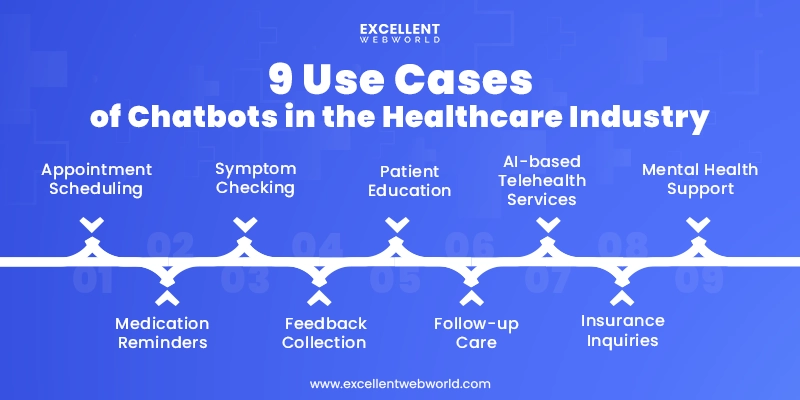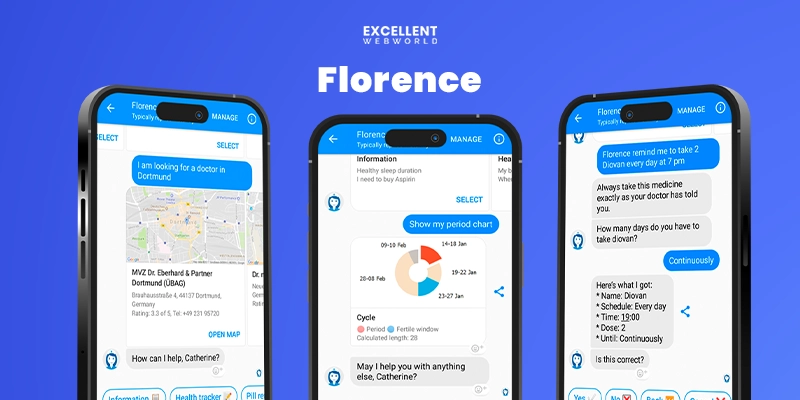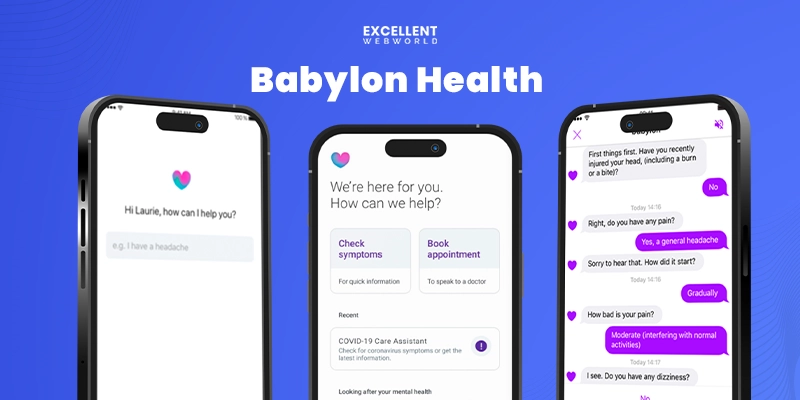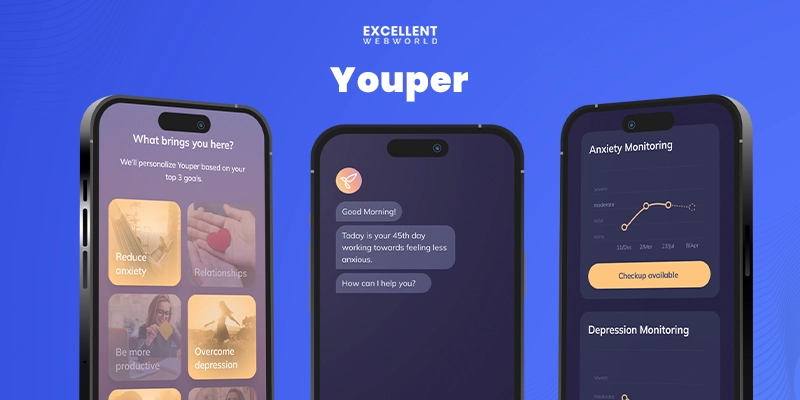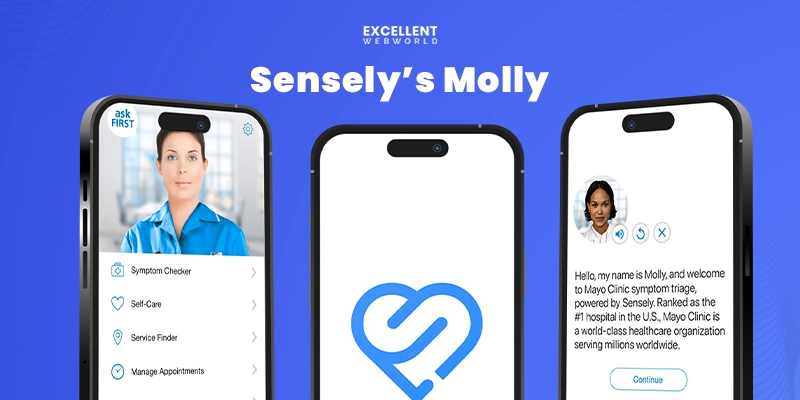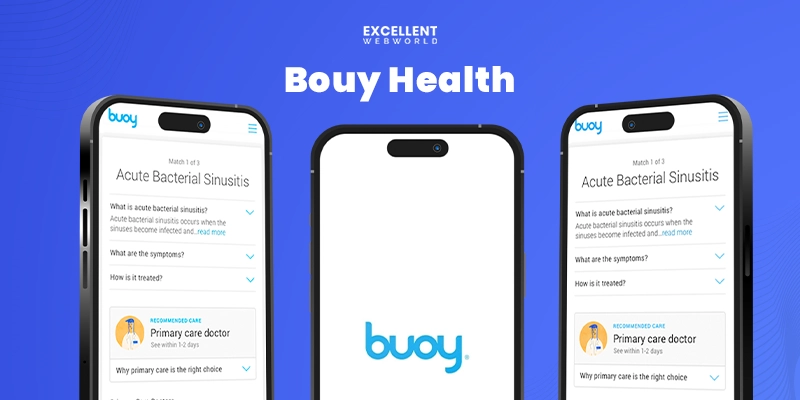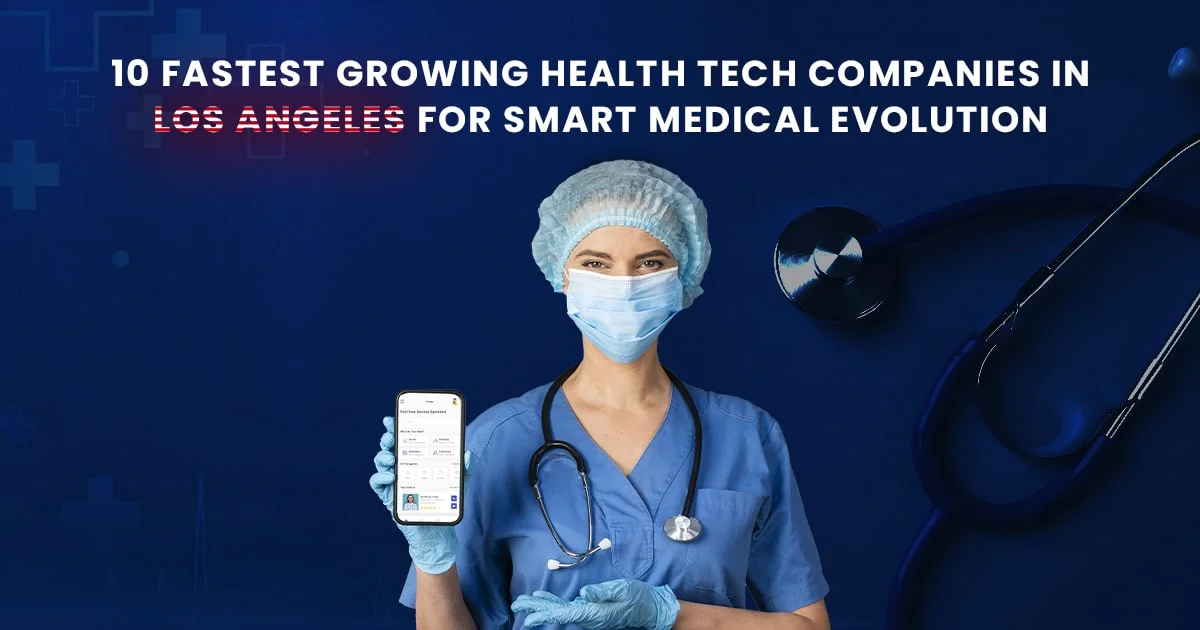If you run a medical practice, you know how challenging managing administrative tasks and patient engagement can be. Fortunately, Artificial Intelligence (AI) chatbots are transforming healthcare by helping automate data collection, streamline communication, and boost patient interaction.
Healthcare providers increasingly rely on chatbots to reduce staff workload and enhance patient satisfaction. Beyond these benefits, chatbots offer a wide range of advantages tailored to various healthcare scenarios.
In this article, we’ll break down the key benefits, most useful real-world use cases, and top-performing examples of chatbots in healthcare. Want to know how fast this trend is growing? The latest AI in healthcare statistics reveal just how rapidly this trend is accelerating.
What Is a Healthcare Chatbot and How Does AI Power It?
Healthcare chatbots are AI-powered software applications that automate and optimize patient interactions. They use AI and natural language programming (NLP) to understand, process, and respond to patient inquiries. Chatbots can be voice-based or text-based.
Voice assistants streamline patient communication by mimicking human-to-human interactions. Integrating electronic health records (EHR) in chatbots can also improve patient data management.
Knowing what and how these chatbots enable advanced patient interactions makes a strong argument in their favor. But why should you invest in this area of healthcare software modernization? Here is the answer!
5 Key Benefits of AI Healthcare Chatbots for Hospitals & Clinics
Here are the key benefits of chatbots in healthcare industry to consider before deciding to develop a healthcare chatbot for your organization.
1. Improved Patient Engagement with Healthcare Chatbots
AI-based chatbots in healthcare can hyper-personalize patient interactions. These bots analyze patients’ medical histories, preferences, and symptoms. For example, if a patient has diabetes, AI can analyze the data and provide custom food recommendations.
Chatbots help healthcare businesses ensure real-time communication with 24/7 availability. You can customize the patient engagement software to integrate chatbots, ensuring streamlined communications.
2. Reduced Patient Wait Times and Hospital Operational Costs
Immediate response is crucial in emergencies. Due to availability and accessibility issues, patient interactions can become time-consuming. However, in an emergency, patients can’t afford long wait times. Chatbots help reduce wait times, ensuring timely access to healthcare data.
Using AI-based chatbots in healthcare can improve customer service by leveraging empirical data. They can analyze historical data to resolve symptoms, diet, and medication queries, reducing costs and the load on hospitals’ existing customer service.
3. Ease of Access to Healthcare Data and EHR Integration with Chatbots
A key benefit that chatbots provide in the healthcare industry is the ease of data access. Patients can use chatbots to access data on nearby medical facilities, pharmacies, and test labs.
You can customize these chatbots for specific conditions. For example, you can use custom AI models to create an asthma-specific chatbot. It can offer critical data on whether a patient has asthma or other pulmonary conditions.
4. Improved Hospital Administration and Workflow Automation via Chatbots
Hospital administration involves many tasks that chatbots can help optimize. For example, manually creating invoices and insurance documentation can be complex due to compliance requirements. Hospital admins can automate medical billing and documentation for insurance claims using chatbots in healthcare services.
Another crucial administrative task is assigning care providers to patients. Large-scale hospitals need to ensure quality patient care. This includes scheduling surgeries, managing healthcare services, and handling the patient admission process.
With the help of an experienced AI chatbot development company, hospital admins can implement workflow automation tools that improve efficiency and reduce human errors.
5. Faster Prior Authorizations and Insurance Processing
Most clinicians must obtain prior authorizations (PAs) before creating a treatment plan, which includes prescribing specific treatments, medications, or lab tests. However, PAs can take up to two business days. This is where an AI-based chatbot can help.
Chatbots can gather crucial patient information and automate critical PA documentation. If you have a clinic, you can use chatbots to reduce the time spent on documentation. Handling several PA documentation at scale needs a robust system. You can leverage cloud computing resources in your healthcare systems to offer PA documentation at scale.
The impact of integrating chatbots in healthcare is significant, and you can customize it as needed. However, customizations depend on how you want to use chatbots in your healthcare services.
Top 9 Healthcare Chatbot Use Cases
Here are nine different healthcare chatbot use cases:
1. AI Chatbots for Appointment Scheduling in Healthcare
The use of chatbots in healthcare allows you to automate the appointment scheduling for medical surgeries, consultations, and telehealth services. Chatbots leverage NLP to communicate effectively with patients and understand their preferences. Based on the patient’s preferences, it automates scheduling, rescheduling, and cancellation of consultations.
Besides patient preferences, AI algorithms access medical history and determine the urgency before scheduling consultations.
2. Symptom Checker Chatbots Powered by NLP and Machine Learning
Using chatbots, patients can check symptoms during the pre-diagnosis phase. These AI-based assistants interact with patients and gather symptom data, helping you optimize treatment plans. A chatbot for hospitals can also help determine patients’ critical symptoms before admission.
Chatbots use specific questionnaires to collect symptom data from patients. You can leverage healthcare app development and integrate IoT-based devices with chatbots to track symptoms optimally.
3. Medication Reminder Chatbots for Patient Support
Chatbots in healthcare apps can help elderly patients and those with disabilities remember their daily medication. This feature allows patients to maintain their medication routine.
If you are a healthcare provider, it helps track if a patient has missed medication. These medication reminders become crucial, especially in managing chronic diseases and critical illnesses.
Further, health insurance services can add reminders for medicine refills and vaccinations. Healthcare service providers can also partner with pharmacies to build customized reminders.
4. Patient Education and Digital Health Assistants
Hospital admins and medical practitioners can use chatbots to educate patients. Chatbots can help share critical educational data with patients if you have a medical practice. Educational content can include content on optimal diets, exercise, and healthier routines.
Each patient has unique needs. Chatbots allow you to cater to these needs through personalized health education.
5. AI-Based Telehealth Chatbots for Virtual Care
AI chatbots can help patients quickly set up virtual consultations. Patients can use video or voice-based telemedicine apps to communicate virtually with care providers. The handshake between chatbots and telemedicine services needs to be seamless. To ensure this, you must train the AI models to identify when patients need a virtual consultation.
Read More: How Much Does Telemedicine App Development Cost?
6. Insurance Inquiry Chatbots for Healthcare Providers
Patients often inquire about insurance coverage, which can intensify during a health crisis. Chatbots can reduce the stress of a health crisis by providing essential details about insurance coverage, including coverage for healthcare services, medicine, and facilities.
As a healthcare provider, you can build custom AI models for specific insurance queries. For example, if you are a surgeon, patient queries will revolve around surgeries. So, the chatbot should be able to answer questions on prior authorization for surgeries and insurance claims.
7. Follow-Up Care Automation Using Healthcare Chatbots
Follow-up communication is critical once you provide a diagnosis of a patient’s illness. These bots can communicate with patients and educate them on the next steps. Such chatbots can also provide educational content on crucial diets after the diagnosis.
Follow-up communication also includes gathering data on prescribed tests and adjusting treatment accordingly. Chatbots can provide insights based on test results and the patient’s medical history.
8. Mental Health Support Chatbots and 24/7 Patient Assistance
Chatbots offer 24/7 mental health support. The AI models at the core of these chatbots can analyze mental conditions through FAQs and provide customized support to patients. You can also integrate voice-based chatbots in healthcare services specific to mental health issues, which is becoming a common practice in AI in healthcare app development.
Such bots can help,
9. Feedback Collection and Patient Satisfaction Chatbots
Feedback collection helps hospital admins identify gaps and improve the patient experience. AI chatbots can gather feedback from patients regarding the clinic experience. This feedback can be on facilities, the admission process, and diagnosis in general.
The healthcare chatbot use cases discussed here are just the tip of the iceberg! As technologies evolve, many more innovative use cases will emerge. To stay ahead, partnering with a reliable AI chatbot development company can provide tailored solutions that adapt to emerging healthcare needs.
This raises the question, “Are chatbots the future of the healthcare industry?” The answer is complex and needs analysis of trending innovations contributing to healthcare digital transformations.
What is The Future of AI Healthcare Chatbots?
Healthcare chatbots are evolving and helping healthcare service providers improve efficiency. Not just for customizing medical services, the usage of chatbots in its customer service has also been significant. In fact, Gartner predicts chatbots will become the primary source of customer service by 2027.
But are these only aspects of the healthcare industry chatbots are transforming?
Here are some innovations in different healthcare industry use cases for chatbots,
1. Immersive Conversational Healthcare Bots
Chatbots can help educate patients immersively with augmented reality/virtual reality (AR/VR) technology. You can offer immersive patient education using AR/VR-based content integrated into chatbots.
To optimize crucial operations, you can also customize AR/VR-based chatbots in healthcare services. For example, you can create custom chatbots to help surgeons in critical surgeries.
2. AI Chatbots for Custom Medical Scans and Diagnostics
If you are familiar with Star Trek: The Next Generation, you must have observed a scene in which computers are used for medical examinations. This may seem like science fiction, but it has become a reality with Neko Health. It is a startup from Spotify’s Daniel Ek that uses AI to scan humans for medical examinations.
You can build a similar system by integrating an AI chatbot into your healthcare services. These systems can automatically scan patients to reveal critical health data. The best part is that you can customize scans according to your practice and improve accuracy.
3. Smart Patient Monitoring with AI-Driven Chatbots
You can create chatbots for smart patient monitoring. This feature will help you improve follow-up diagnoses and monitor patients’ vitals. For example, if a patient has diabetes, you can customize the chatbot to monitor glucose levels smartly.
By integrating IoT-based devices into the system, you can build a chatbot that warns patients about each spike in their sugar levels. Health insurance companies can use such systems to monitor patients’ diets, exercises, and routine habits.
4. AI-Driven Compliance, Data Security, and Privacy in Healthcare
Every healthcare service provider must comply with data regulations, such as HIPAA. For example, hospitals must create medical bills based on ICD-10 and CMS guidelines.
Using chatbots in healthcare, hospitals can ensure compliance with insurance regulations. Especially, coding errors are a significant issue in medical bill generation. Through medical billing software development, healthcare startups can integrate AI-powered chatbots to ensure accuracy in coding, improve compliance, and optimize the billing process.
5. Smart EHR Systems Integrated with AI Chatbots
An EHR record contains a patient’s entire medical history, including data on allergies, medications, and diagnoses. Based on this data, EHR-integrated chatbots allow you to personalize treatments.
These innovations in healthcare chatbots will change the way patients access healthcare services. However, many chatbots are already using AI to transform healthcare services. Here are some key examples.
5 AI Healthcare Chatbot Examples You Need to Know
AI innovation is making chatbots an attractive investment for many healthcare startups. As a result, the healthcare chatbot market is growing at a CAGR of 23.9%. However, analyzing the competition is crucial if you want to invest in a chatbot. Here are some top health chatbots and healthcare chatbot examples that are acing the market.
1. Florence
Florence is an all-in-one chatbot that acts as a medical assistant. It helps patients with medication reminders, offers information on specific conditions, and manages illness. The Florence bot also helps patients automatically search for the best doctors and clinics based on their health needs. It comes with integrated Facebook Messenger and Skype support.
2. Babylon Health
Babylon Health is an all-in-one platform that offers on-demand healthcare services. It uses AI to check symptoms and offers on-demand telemedicine consultations. This chatbot app allows users to make voice or video calls with clinicians.
3. Youper
Youper is one of the leading mental health chatbots in the healthcare industry. It uses cognitive behavioral therapy (CBT) to assess a patient’s mental health in a personalized way. Based on the evaluation, the chatbot offers insights into mental, emotional, and behavioral health. Plus, you get instant support for mental health issues.
4. Sensely’s Molly
Senely’s Molly is your one-stop chatbot for all things healthcare. Patients can check patients and connect with clinicians instantly through the app. Caregivers and medical practitioners can personalize the patient experience through AI avatars. The best part about the Moly chatbot developed by Sensely is customization. Practitioners can customize the NLP model according to their treatment plans.
5. Buoy Health
Bouy Health is another chatbot that offers several AI-based features. For example, it uses NLP and AI to provide smart recommendations to patients based on their symptoms. Plus, the app comes with integrated telehealth services. So, if a patient needs assistance from doctors, they can access healthcare experts through the app.
These chatbots offer advanced functions like automatic pre-diagnosis insights and body scans. However, you need an expert AI development service to develop AI-based chatbots that align with your practice.
How Does Excellent Webworld Help Build AI Chatbots in Healthcare Projects?
We hope this article has offered profound insights into why you should consider investing in AI chatbots for your medical practice. If you’re looking for someone to assist you with it, Excellent Webworld is right here at your service.
With over thirteen years of experience and delivering 900+ successful projects, our experts are adept in integrating custom AI models to implement chatbots in your healthcare systems. Get customized AI consulting services from our experts to leverage cutting-edge technologies and implement chatbots efficiently.
We design solutions that meet healthcare UX trends as well as your business-specific requirements and guarantee improved patient care. Our experts create customized chatbot solutions for healthcare that align with your healthcare business goals. Plus, we have expertise in healthcare app development. This means you get a holistic solution for your healthcare business.
Excellent Webworld is a custom healthcare app development company, trusted for building custom medical chatbots that actually improve patient care, simplify interactions, and optimize operations. Connect with our team today to explore how custom AI chatbots can upgrade your healthcare services.

Article By
Mahil Jasani began his career as a developer and progressed to become the COO of Excellent Webworld. He uses his technical experience to tackle any challenge that arises in any department, be it development, management, operations, or finance.

